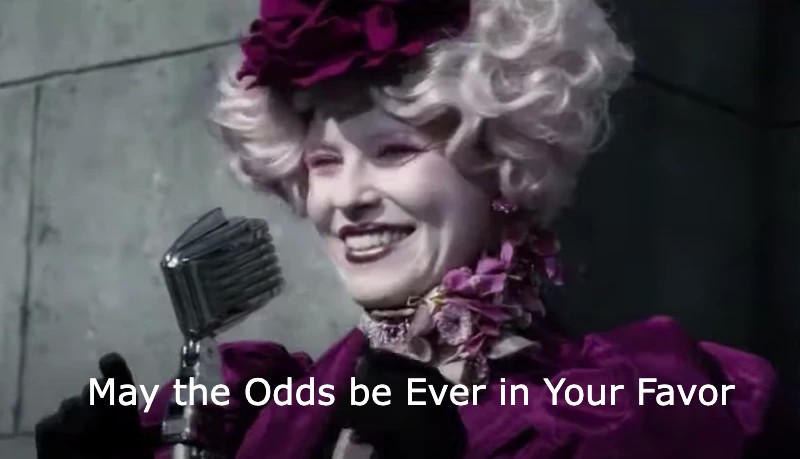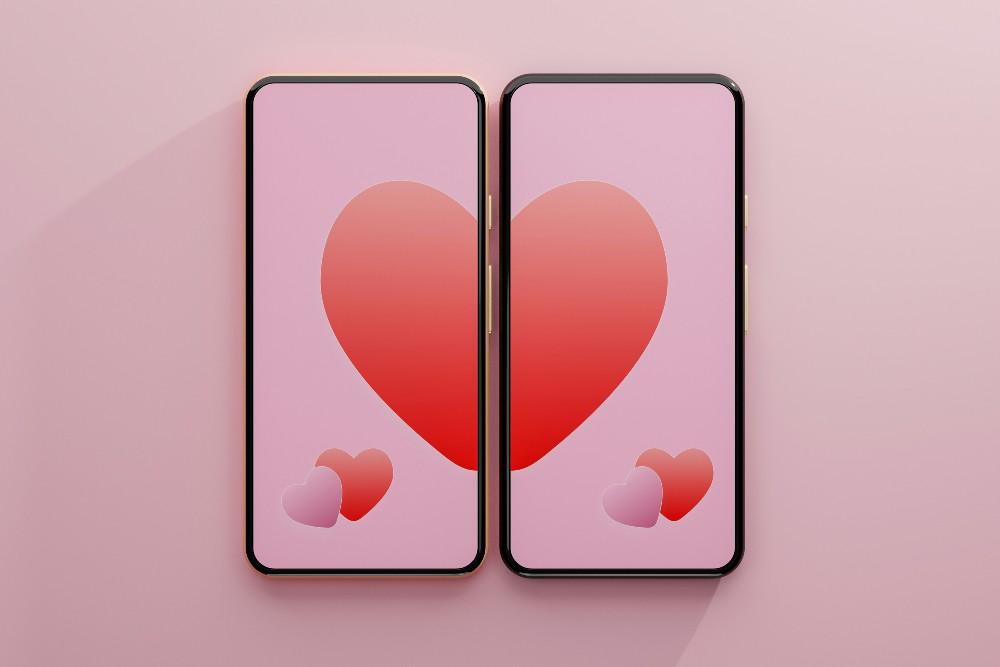Unless you’ve read The Hunger Games (2009) by Suzanne Collins or watched the corresponding movie series that started in 2012, there’s a good chance you won’t understand the meaning behind the catchphrase, “May the odds be ever in your favor.”
It started out as a line of dialogue in the books, and later the movies, that was used to wish contestants good luck, but the Hunger Games fandom has turned it into much more than that by incorporating it into their daily lives.
Whether someone you know has a job interview, a sports game, or an exam coming up, “may the odds be ever in your favor” is a nice way to wish them luck for their coming challenge. It is also often used ironically, due to how it was used in the books and movies.
So let’s learn a bit more about the meaning of the phrase, its history, and how you can adopt it into your daily conversations.
What Does “May the Odds be Ever in Your Favor” Mean?
The phrase, may the odds be ever in your favor, might sound a little strange if you’re not used to older English, but it’s really quite simple. Let’s break down words to make it easy to understand.
May
The word “may” shouldn’t be too confusing. We’ve all been hearing it in Star Wars for all or most of our lives – “May the Force be with you.” If you’re not into Star Wars, you might have heard it in a religious context – “May the Lord bless you.” It is something like a prayer or a request.
The Odds
“The odds” is a common term that simply means, “the chances.” What are the odds of winning the lottery, or what are the odds of getting hit on the head by a falling coconut? In this case, it refers to the sheer luck of a gamble – each contestant’s odds of winning the Hunger Games against 23 other children.
Be Ever
“Be ever” just means always or forever.
In Your Favor
“In your favor” could be written as “be yours.” So the entire expression could be rewritten as, “May good luck always be yours,” or “I hope you have the best chance of winning.”
While this might sound like a nice thing to say to someone, and it can be used that way, in the books and films, it was definitely used more ironically. Here’s a bit about that story:
The Hunger Games Story
The Hunger Games is the story of a dystopian future for Earth, in which the human population is divided very strictly into class systems that range from ridiculously rich to devastatingly poor.
Each class has its own district, and residents are not allowed to leave their district unless under orders from the ruling class. There are 13 districts, but the 13th is no longer included in the Hunger Games after winning a rebellion against the Capitol.
The unfair rules, regulations, and restrictions used to keep the poor in check are absolutely horrific, and include forcefully entering their children between the ages of 12 and 18 into the Hunger Games – every year, a boy and a girl from each district are conscripted by a lottery to compete in a fight to the death that is televised across the nation.
A number of times, including at the start of the death match, a flamboyant character named Effie Trinket, who is the official escort to the contestants from District 12, Katniss Everdeen and Peeta Mellark, jauntily says, “Happy Hunger Games, and may the odds be ever in your favor!” This is ironic in a number of ways:
- She is saying “Happy Hunger Games” to a group of children who are going to be forced to murder each other, and she says it with a smile.
- She sees the Hunger Games as pure entertainment and has no real care for the well-being of the contestants or who will win in the end.
- No matter who wins, nobody really wins – the winner will have to live the rest of their life with the memory of those whose lives they had to take to survive.
- The phrase is said to all 24 contestants at the same time, meaning that they don’t really wish luck to anyone specific – it’s just something to say for the viewers.
- It also suggests that winning the Hunger Games is more down to chance than skill, strength, or will, which is not really true, especially since the wealthier districts train their children for the games from a young age. Something the poorer districts can’t afford to do, even if they wanted to.
The winner becomes a symbol for their district and receives lifelong income and a nice place to live for themselves and their family. However, all the district gets is some extra food for a year, which shows us how unfair this society is, over and above their willingness to allow children to kill each other to keep the people in check.
If you want to know how it works out for Katniss and Peeta, you’ll just have to grab some popcorn and settle down for a movie marathon! It’s a story well worth investing some time in.
How Can You Use the Phrase “May the Odds be Ever in Your Favor” in Your Daily Life?
If you really like the sound of the phrase, and you’d like to start saying it more often, there are a couple of ways you can use it in your own life.
To Sincerely Wish Someone Luck
If you want to use the expression in a non-ironic way, you can say it to just about anyone who has something difficult or life-changing coming up. You could use it if a friend is moving house, buying a new car, changing jobs, getting married, or having a child (though these last 2 could be both sincere and ironic).
To Be Sarcastic or Ironic
Using the phrase ironically is a great way to reference the original story and be humorous about a person’s situation.
For example, if you have been married and it didn’t work out, when your friend tells you they’re getting married, you could say, “May the odds be ever in your favor” with an ironic smile on your face. In this context, your wish would not just mean good luck, it would also mean, you’re going to need it!
Conclusion
“May the odds be ever in your favor” is a catchphrase from the books and films called The Hunger Games. The story is set in a dystopian future in which the rich control the poor with an annual, televised fight to the death between 24 teenagers, a boy and a girl from each of the 12 districts.
The expression simply means, “good luck,” though the way it is used in the story is rather ironic. The character of Effie Trinket says the phrase a few times, prefaced by the words, “Happy Hunger Games,” which is an inhumane and silly thing to say to a group of children who are being forced to murder each other.
In real life, you can use the phrase to sincerely wish someone good luck, or as an ironic statement when you think something they are excited about will be more difficult than they are expecting. However you choose to use it, have some fun and always be kind.





